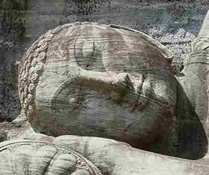 |
Reclining
Buddha Polonnaruwa, Sri Lanka |
All
things are subject to decay, strive on with diligence.
Last words of the Buddha
The idea that all things are transient is central to Buddhist teaching. Loss and impermanence are things to be accepted rather than causes of grief, and the passing of the Buddha himself—observed by Mahayana Buddhists on Parinirvana Day—is thus an occasion for celebration, as it marks the Buddha’s release from the cycle of death and rebirth, which is the ultimate aim of Buddhism.
After his enlightenment, the Buddha spent forty years teaching. He died in the village of Kusinara in India when he was eighty years old, having passed peacefully into nirvana. Buddhists mark the day by meditating or by visiting the temple or monastery. It is an opportunity to reflect on one’s own future death, and to remember those who have recently passed away.
Parinirvana means ‘completed nirvana’, and the Buddha’s last days and final message to his followers are described in the Pali text called Maha-parinibbana Sutta, the “‘Great Parinirvana Sutra’, extracts of which are often read on this day.